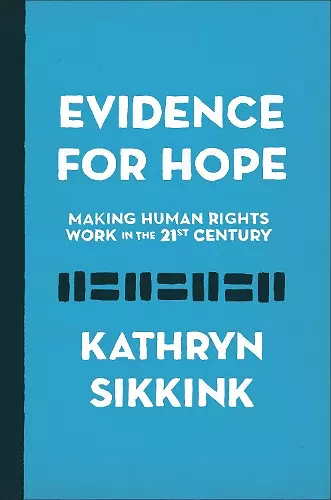Evidence for Hope
Making Human Rights Work in the 21st Century
Format:Hardback
Publisher:Princeton University Press
Published:29th Sep '17
Currently unavailable, and unfortunately no date known when it will be back
This hardback is available in another edition too:
- Paperback£22.00was £22.00(9780691192710)

A history of the successes of the human rights movement and a case for why human rights work Evidence for Hope makes the case that, yes, human rights work. Critics may counter that the movement is in serious jeopardy or even a questionable byproduct of Western imperialism. They point out that Guantanamo is still open, the Arab Spring protests have been crushed, and governments are cracking down on NGOs everywhere. But respected human rights expert Kathryn Sikkink draws on decades of research and fieldwork to provide a rigorous rebuttal to the pessimistic doubts about human rights laws and institutions. She demonstrates that change comes slowly and as the result of struggle, but in the long term, human rights movements have been vastly effective. Attacks on the human rights movement's credibility are based on the faulty premise that human rights ideas emerged in North America and Europe and were imposed on developing southern nations. Starting in the 1940s, Latin American leaders and activists were actually early advocates for the international protection of human rights. Sikkink shows that activists and scholars disagree about the efficacy of human rights because they use different yardsticks to measure progress. Comparing the present to the past, she shows that genocide and violence against civilians have declined over time, while access to healthcare and education has increased dramatically. Cognitive and news biases contribute to pervasive cynicism, but Sikkink's investigation into past and current trends indicates that human rights is not in its twilight. Instead, this is a period of vibrant activism that has made impressive improvements in human well-being. Exploring the strategies that have led to real humanitarian gains since the middle of the twentieth century, Evidence for Hope looks at how these essential advances can be supported and sustained for decades to come.
"Honorable Mention for the 2019 Luciano Tomassini Latin American International Relations Book Award, Latin American Studies Association"
"[Sikkink] effectively demonstrates what has been done in the past, giving doubters and pessimists reason to hope about what can be done in the future. From a scholarly activist, a solid and encouraging piece of research on the status of human rights around the world." * Kirkus *
"While ‘the gap between our ideals and our current practice' can give us ‘the anger we need to fight for change’, we also need the sense of hope derived from knowing that--and how--we can make a difference. Here we find the essential ‘evidence for hope’."---Matthew Reisz, Times Higher Education
"Evidence for Hope combines scientific rigour in addressing major, contemporary criticisms of human rights with the ability to propose objective means of promoting them exactly where it seems most crucial."---Isabela Garbin Ramanzini, International Affairs
"Drawing on decades of research into transational civil society networks and international institutions, Sikkink counters skeptics from the left and the right who have argued that the persistence of grave human rights violations throughout the world is evidence that the movement has failed and should be abandoned altogether. On the contrary, she concludes, the struggle for human rights has indeed made a difference."---Caroline Bettinger-López, Foreign Affairs
"Does the evidence really hold up that the world faces a fallback in human rights and a rise in political violence against innocent civilians? Not according to a leading human rights scholar, Kathryn Sikkink of Harvard University. In her latest book, Evidence for Hope: Making Human Rights Work in the 21st Century, she presents a slew of data about progress in basic rights since the 1940s and warns against a tendency by activists and the media not to stress progress and successes." * Christian Science Monitor *
"Kathryn Sikkink’s scholarship has inspired a generation of scholars who have followed her efforts to analyze U.S. human rights policy, human rights politics in Latin America, and the influence of transnational human rights activism. Her new book . . . further confirms her place as a major figure in the field."---Sarah B. Snyder, H-Diplo Roundtable Review
"Evidence for Hope is a valuable resource for teaching human rights in a way that both enables our students to critique while empowering them to act."---Brett J. Kyle, International Dialogue
ISBN: 9780691170626
Dimensions: unknown
Weight: 595g
328 pages